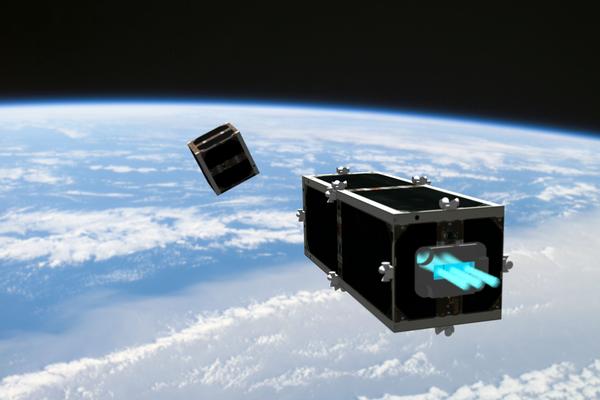

The growing space junk problem in various orbits around the Earth gets plenty of ink these days, particularly when the ISS has to fire its thrusters to dodge a piece of a satellite, or when a defunct satellite smashes into a perfectly good, multimillion dollar piece of orbital communications hardware. Gathering up and disposing or all that fast-moving refuse makes for a difficult problem, but over at EPFL in Switzerland a team of researchers is developing a new kind of micro-sat that could help clean up low Earth orbit, starting by disposing of Switzerland’s own leftover space debris.
CleanSpace One is a project aimed at building a prototype for a family of satellites that would chase down and capture small pieces of orbital debris. NASA is currently tracking some 16,000 pieces of junk larger than about four inches diameter, but the agency estimates there are many more times that ripping around the planet at orbital speeds (call it 17,500 miles per hour).
Each one is a disaster waiting to happen; orbital debris threatens satellites, spacecraft, and astronauts moving within and through its orbit, potentially costing lots of money or even human lives. All kinds of proposals for dealing with the problem–everything from trash collecting satellites to ground based lasers that would zap orbital debris from the sky–have been put forward, but so far nothing has gained traction. EPFL (that’s the École Polytechnique Fédérale de Lausanne) hopes to change that.
CleanSpace One would not be a massive trash-collecting satellite, but a tiny trash-chaser designed to destroy exactly one piece of debris. The first target will be one of two small Swiss picosatellites launched in 2009 and 2010 that are still in orbit up there though their scientific missions are done. CleanSpace One would track down one of the satellites in its orbit, latch onto it with some kind of gripper, and drag it back into Earth’s atmosphere where both would burn up on re-entry.
Simply doing so would require some key technology pieces, both of which EPFL is working to develop in-house, possibly employing a new brand of super-compact space motor currently in the lab there. It will also require some kind of gripping mechanism that can secure the targeted piece of debris and drag it downward.
Of course, at 10 million Swiss francs (that’s about $10.8 million) it seems like an expensive way to capture small pieces of orbital trash. But the idea is to develop a suite of technologies and then a family of satellites designed purely to clean up orbit. Economies of scale and putting many of these small debris chaser on a single launch could drastically drive the cost of deployment down. Get a full rundown of the problem and the EPFL program below.

